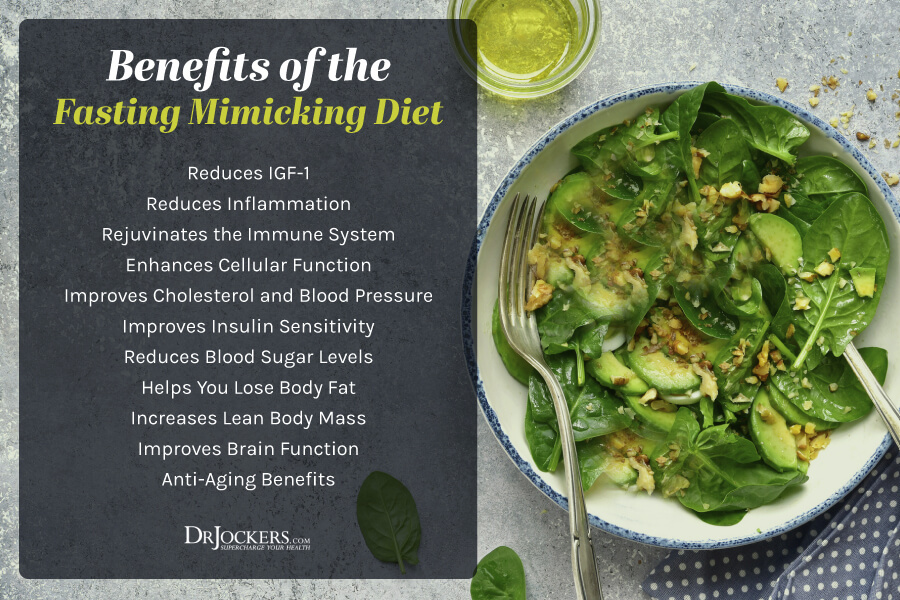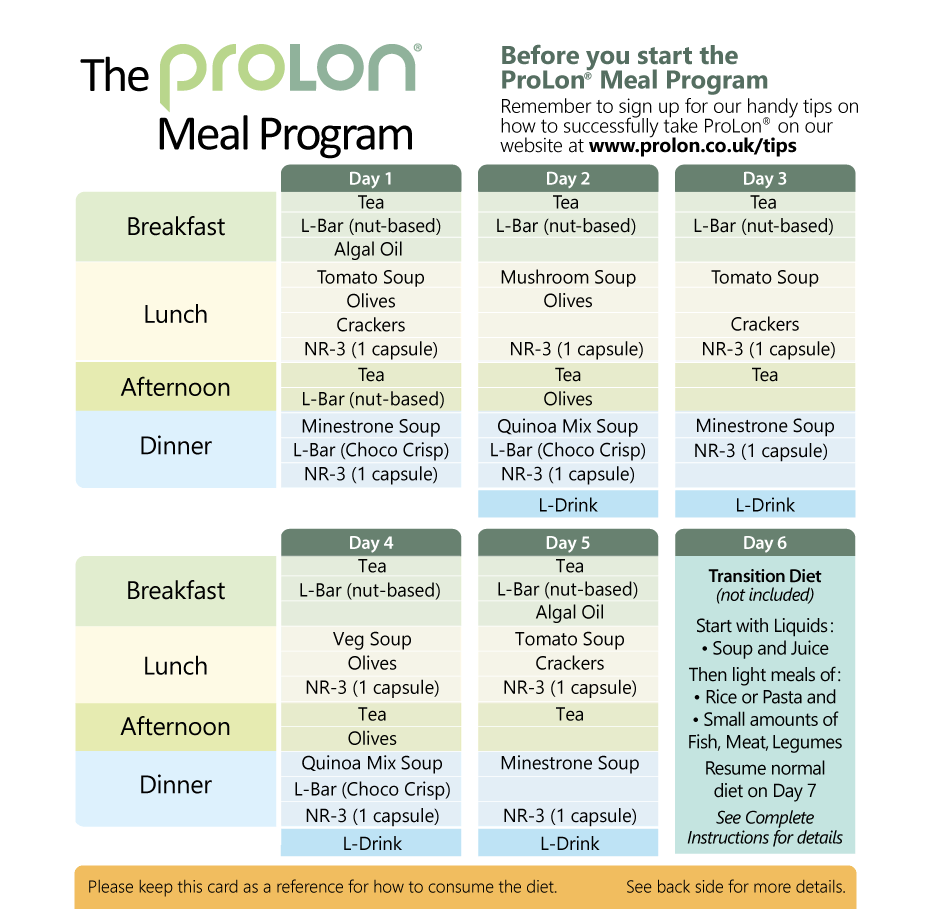The Fasting Mimicking Diet is a 5 day program that “tricks” your body into thinking it’s fasting, thereby bestowing all the benefits of fasting, without the hunger, mental discipline and associated discomfort of a water only fast. With 25 years of research behind the benefits of fasting (more below), there’s good reason to incorporate it into your wellness regimen. And with a little quarantine fluff to lose, I took this opportunity to find out for myself.
Why Fast?
Fasting has had a bump in popularity in recent years, and for good reason. Defined as abstinence from food and/or some drinks for a period of time, there are several popular ways to incorporate fasting.
- Water only fasts: typically for 24-72 hours, only water is consumed
- Dry fasting: no food or water (not recommended by me)
- Intermittent fasting: limiting food intake to a set number of hours per day – usually 16, 18, or 24 hours (ex: fasting from 6pm to 10am for a 16/8 fast, or doing a 24 hour fast one day per week). I personally love to incorporate Bulletproof Coffee into my IF routine, & do so roughly 5 days per week.
There are multitude of fasting benefits. Here are some of them, with the science to back them up.

- Improved Blood Sugar Control: several studies have found that fasting may improve blood sugar control, which could be especially useful for those at risk of diabetes. Decreasing insulin resistance can increase your body’s sensitivity to insulin, allowing it to transport glucose from your bloodstream to your cells more efficiently. Coupled with the potential blood sugar-lowering effects of fasting, this could help keep your blood sugar steady, preventing spikes and crashes in your blood sugar levels. One study in 10 people with type 2 diabetes showed that short-term intermittent fasting significantly decreased blood sugar levels (more here). Another study found that fasting may impact blood sugar levels differently for men and women. This small, three-week study showed that practicing alternate-day fasting impaired blood sugar control in women but had no effect in men (more here).
- Reduced Inflammation: While acute inflammation is a normal immune process used to help fight off infections, chronic inflammation is at the heart of many of today’s degenerative diseases. It’s involved in the development of heart disease, cancer and autoimmune diseases like rheumatoid arthritis (research here). Studies show that fasting can help decrease levels of inflammation and help promote better health. This study in 50 healthy adults showed that intermittent fasting for one month significantly decreased levels of inflammatory markers. Another small study discovered the same effect when people fasted for 12 hours a day for one month. Additionally, one animal study found that following a very low-calorie diet to mimic the effects of fasting reduced levels of inflammation and was beneficial in the treatment of multiple sclerosis, a chronic autoimmune condition.
- Improved blood pressure, triglycerides and cholesterol levels: Heart disease is the leading cause of death around the world, accounting for an estimated 31.5% of deaths globally. Improving your nutrition and lifestyle is one of the most effective ways to reduce your risk of heart disease. Incorporating fasting into your routine may be especially beneficial when it comes to heart health. One study revealed that eight weeks of alternate-day fasting reduced levels of “bad” LDL cholesterol and blood triglycerides by 25% and 32%, respectively. Another study of 110 obese adults showed that fasting for three weeks under medical supervision significantly decreased blood pressure, as well as levels of blood triglycerides, total cholesterol and LDL cholesterol.
- Boosts brain function & prevents neurodegenerative disease: Though research is mostly limited to animal research, several studies have found that fasting could have a powerful effect on brain health. One study in mice showed that practicing intermittent fasting for 11 months improved brain function and brain structure (more here). Other animal studies have reported that fasting could increase the generation of nerve cells to help enhance cognitive function (here & here). Because fasting may also help relieve inflammation, it could also aid in preventing neurodegenerative disorders. Specifically, studies in animals suggest that fasting may protect against and improve outcomes for conditions such as Alzheimer’s disease and Parkinson’s (here & here).
- Aids weight loss: Naturally, abstaining from all or certain foods and beverages should decrease your overall calorie intake, which could lead to increased weight loss over time.Some research has also found that short-term fasting may boost metabolism by increasing levels of the neurotransmitter norepinephrine, which could enhance weight loss. In fact, one review showed that whole-day fasting could reduce body weight by up to 9% and significantly decrease body fat over 12–24 weeks (more here). Another review found that intermittent fasting over 3–12 weeks was as effective in inducing weight loss as continuous calorie restriction and decreased body weight and fat mass by up to 8% and 16% respectively (more here). In addition, fasting was found to be more effective than calorie restriction at increasing fat loss while simultaneously preserving muscle tissue (more here).
- Increases HGH: Human growth hormone (HGH) is central to many aspects of your health. Research shows that this key hormone is involved in growth, metabolism, weight loss and muscle strength (more here). Several studies have found that fasting could naturally increase HGH levels. Further, because fasting helps maintain steady blood sugar and insulin levels throughout the day, which may further optimize levels of HGH, as some research has found that sustaining increased levels of insulin may reduce HGH levels (more).
- Extends longevity: One of the more compelling side effects of fasting and the focus of Valter Longo’s work. Fasting increases autophagy (cleaning out damaged cells) and delays aging. = In one study, rats that fasted every other day experienced a delayed rate of aging and lived 83% longer than rats that didn’t fast (more here). For LOTS of research on this check The Longevity Diet by Dr. Valter Longo.
- Aids cancer prevention & eases chemotherapy: Animal and test-tube studies indicate that fasting may benefit the treatment and cancer prevention. In fact, one rat study found that alternate-day fasting helped block tumor formation. Similarly, a test-tube study showed that exposing cancer cells to several cycles of fasting was as effective as chemotherapy in delaying tumor growth and increased the effectiveness of chemotherapy drugs on cancer formation (more here).
Why Fasting Mimicking Diet?
While I regularly enjoy the benefits of 16/8 fasting (which for me includes increased energy and weight management), I wanted to try the FMD to take a deeper dive into prolonged fasting (and serve as guinea pig before recommending to patients). While I have long been a proponent of cleansing for detoxification, I’ve never really embraced water fasting or similar quick weight loss strategies. Outside of periodic metabolic detox (which I would argue is even more important than nutrition) I’m much more a fan of lifestyle change and implementing sustainable changes for the longterm.
I have a number of patients with autoimmune issues and knew this could be a powerful strategy for improving their health and reducing inflammation. While I wouldn’t say it’s “easy,” 5 days of calorie reduction and planned nutrition is far more doable than five days of water. Each day of food comes in individual packets and in a box clearly marked for each day. It’s dummy proof. The first day is 1150 calories and days 2-5 are 725 calories. Here’s the food plan laid out for each day.

Here’s my “Captain’s Log” of my daily experience.
Day 1: Smooth sailing. I was a little hungry but really nothing that couldn’t be solved by more water. I was surprised by how good the food was – I didn’t imagine a powdered soup could pack that much flavor. Today’s food included soups, teas, supplements, a nut bar, olives and even a little chocolate dessert.
Day 2: Here’s where the caloric restriction began and I felt it. I was about 50% hungry all day. I drank a lot of tea, a lot of water and a lot of carbonated water. I also felt lightheaded and mentally foggy for the bulk of the day. I was ready to go to bed at 6pm.
Day 3: I woke up early, a little hungry but put off eating until about 10am. I felt much more mentally clear than day 2, and found that I was full from the soup that I broke my fast with. Finally – the sweet spot of fasting where your stomach “shrinks” and you seem to transcend hunger. A much easier day.
Day 4: I woke up HUNGRY. Not the manageable 50% hunger I’ve been feeling the last few days, but a cumulative hunger from the last few days. There was no waiting to eat – I consumed the nut bar right away, had my black coffee (allowed) and started chugging water. I was motivated by the fact that I was over half way through and also down three pounds.
Day 5: to be reported Friday
It is worth noting that I’ve continued with my workouts (20 minutes high intensity training), which they don’t recommend. I did them first thing; if I had waited until later I may not have had the energy (which is typical for me as I’m a morning person to start with).
In conclusion – if you could be served by any of the benefits above, I’d recommend incorporating it into your wellness strategy. I will likely use it 1-2 times per year, and stick with my intermittent fasting 4-5 days per week.
As always, there are contraindications for certain populations. Who should not fast?
- Pregnant women
- People who are underweight, have anorexia, or have very low body mass index;
- People with liver or kidney disease;
- People over 70 years old unless in superior health (see below);
- Anyone who is fragile;
- People with rare genetic mutations that block the organism’s capacity to produce glucose from glycerol and amino acids (gluconeogenesis); and,
- Athletes during training or competition.
If you fall into these categories, you should get prior approval from your doctor before doing the FMD:
- People with low blood pressure or who take medication for hypertension;
- People over 70 years old who are in superior health;
- Anyone with a serious or relatively serious condition such as cancer, diabetes, cardiovascular disease, autoimmune condition, or neurodegenerative disease.
- People on medications (certain drugs combined with the FMD could result in severe side effects).
As always – we are here for you and your loved ones. If you have any questions, or are interested in the Fasting Mimicking Diet for yourself, let us know. Call us at 843-416-8218 or email us here.
Resources:
Longo, Valter. The Longevity Diet. Penguin Random House. New York, NY. 2016.
www.drjockers.com



